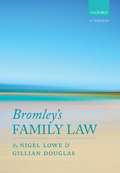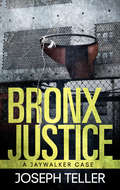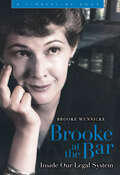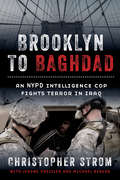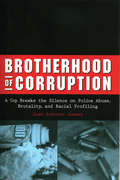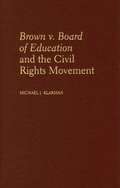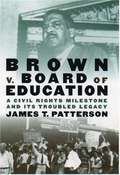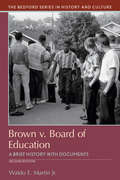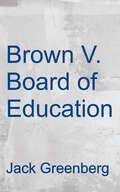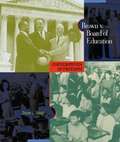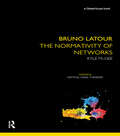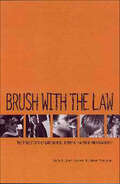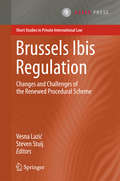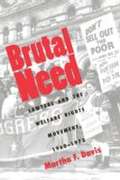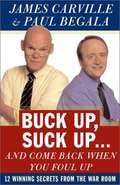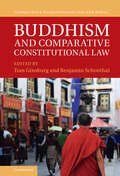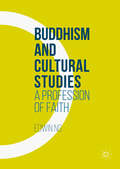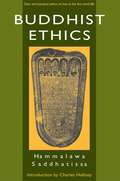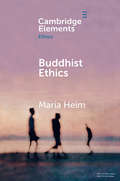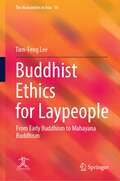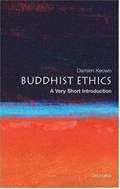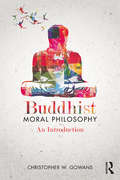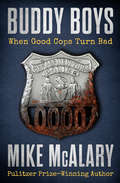- Table View
- List View
Bromley's Family Law
by N V Lowe G DouglasRelied on by generations of students and practitioners alike, Bromley's Family Law remains the definitive guide to the subject. Updated by experts in the area, Nigel Lowe and Gillian Douglas provide an accurate, detailed yet highly readable account of family law. The text presents a broad and comprehensive treatment of the key issues relating to adult and child law in a clear and distilled manner. Regular headings break up the text and allow easy navigation and quick reference for both students new to the subject and those in practice. The new edition has been fully edited and updated to take account of the latest case law and legislation, while also reflecting new debates and emerging issues in the area. Particular attention is also paid to the increasingly significant international dimension of family law, with a new chapter on this area added to the 11th edition.
Bronx Justice
by Joseph Teller"I love the dry wit of Teller's work. Nelson Demille meets Turow or Grisham!"--Goodreads review of Overkill A Jaywalker Case: Book 2 (originally published in 2009) It's the kind of case no one but Jaywalker would take. A young black man from the worst section of the Bronx is accused of raping five women. Five white women. The first four victims have positively identified him, and the fifth is on the verge of doing the same. It's open and shut. But not for Jaywalker. In his effort to make sure justice is done, even--no, especially--for someone who's never really had a shot, he starts looking deeply into character: the defendant's, the victims'--and society's. What he learns will not only change one man's life, it will haunt Jaywalker forever. Don't miss a single one of Joseph Teller's award-winning Jaywalker novels: The Tenth Case Bronx Justice Depraved Indifference Guilty as Sin Overkill
Brooke at the Bar: Inside Our Legal System (Timberline Books)
by Brooke WunnickeBrooke at the Bar is a candid, lively, and sometimes humorous autobiography by Brooke Wunnicke, the first woman to be a trial and appellate attorney in Wyoming and who went on to become a legal legend in Colorado. In conversational writing, Brooke provides insights from a lawyer, mentor, and educator. She advocates that, while not perfect, the United States has the world’s best legal system and that all citizens need to understand and protect their rights, freedoms, and responsibilities. Brooke shares vignettes of her early life—California in the Great Depression, college at Stanford, law school in Colorado during World War II, and the 1946 opening of her Cheyenne law office, a precedent for women in law. She vividly describes memorable and amusing experiences with clients, witnesses, lawyers, juries, and judges and explains some significant cases. She recounts important and dynamic events from her twelve years as Denver’s chief appellate deputy district attorney, an era during which she was an inestimable mentor to many young lawyers who became prominent in the private and public sectors. Brooke passionately believed “the law has been and will continue to be civilization’s hope.” In her book’s final part, she demystifies many legal terms and procedures and describes the parts of a civil jury trial—including information for jurors and witnesses—and provides an enthusiastic and clear refresher on the US Constitution and Bill of Rights. Brooke at the Bar is a unique and historically important contribution that will be of interest to general readers, scholars, and students interested in US law, political science, government, women’s history, twentieth-century western history, civil rights, and legal communities, including those in Wyoming and Colorado, where Brooke was “at the Bar.”
Brooklyn to Baghdad: An NYPD Intelligence Cop Fights Terror in Iraq
by Jerome Preisler Michael Benson Christopher StromBrooklyn to Baghdad is the true story of a retired NYPD intelligence sergeant applying his street-cop tactics and interrogation skills against a lethal insurgency that had infected Iraq. A group of retired Special Forces soldiers and law enforcement experts came together to form the counterinsurgency group codenamed "Phoenix Team." Exposing the corruption of both the Iraqi and US governments, the team faced serious setbacks and challenges. Brooklyn to Baghdad shows the effectiveness of Phoenix Team, their ability to process forensic evidence and human intelligence gleaned through interrogations at the point of capture to provide direct targeting for follow-on missions. This memoir also illustrates the politics of Washington, DC, and the US Army in the war-fighting effort, which continually hampered complete success while simultaneously preserving career aspirations. Throughout are many humorous and emotional anecdotes that reveal the men behind the missions and the toll the theater of war takes on real human lives
Brotherhood of Corruption: A Cop Breaks the Silence on Police Abuse, Brutality, and Racial Profiling
by Juan Antonio JuarezA former Chicago cop exposes shocking truths about the abuses of power within the city's police department in this memoir of violence, drugs, and men with badges. Juarez becomes a police officer because he wants to make a difference in gang-infested neighborhoods; but, as this book reveals, he ends up a corrupt member of the most powerful gang of all--the Chicago police force. Juarez shares the horrific indiscretions he witnessed during his seven years of service, from the sexually predatory officer, X, who routinely stops beautiful women for made-up traffic offenses and flirts with domestic violence victims, to sadistic Locallo, known on the streets as Locoman, who routinely stops gang members and beats them senseless. Working as a narcotics officer, Juarez begins to join his fellow officers in crossing the line between cop and criminal, as he takes advantage of his position and also becomes a participant in a system of racial profiling legitimized by the war on drugs. Ultimately, as Juarez discusses, his conscience gets the better of him and he tries to reform, only to be brought down by his own excesses. From the perspective of an insider, he tells of widespread abuses of power, random acts of brutality, and the code of silence that keeps law enforcers untouchable.
Brown V. Board of Education and the Civil Rights Movement
by Michael J. KlarmanA splendid account of the Supreme Court's rulings on race in the first half of the twentieth century, From Jim Crow To Civil Rights earned rave reviews and won the Bancroft Prize for History in 2005.
Brown V. Board of Education: A Civil Rights Milestone and Its Troubled Legacy
by James T. Patterson2004 marks the fiftieth anniversary of the Supreme Court's unanimous decision to end segregation in public schools. Many people were elated when Supreme Court Chief Justice Earl Warren delivered Brown v. Board of Education of Topeka in May 1954, the ruling that struck down state-sponsored racial segregation in America's public schools. Thurgood Marshall, chief attorney for the black families that launched the litigation, exclaimed later, "I was so happy, I was numb." The novelist Ralph Ellison wrote, "another battle of the Civil War has been won. The rest is up to us and I'm very glad. What a wonderful world of possibilities are unfolded for the children!" Here, in a concise, moving narrative, Bancroft Prize-winning historian James T. Patterson takes readers through the dramatic case and its fifty-year aftermath. A wide range of characters animates the story, from the little-known African Americans who dared to challenge Jim Crow with lawsuits (at great personal cost); to Thurgood Marshall, who later became a Justice himself; to Earl Warren, who shepherded a fractured Court to a unanimous decision. Others include segregationist politicians like Governor Orval Faubus of Arkansas; Presidents Eisenhower, Johnson, and Nixon; and controversial Supreme Court justices such as William Rehnquist and Clarence Thomas. Most Americans still see Brown as a triumph--but was it? Patterson shrewdly explores the provocative questions that still swirl around the case. Could the Court--or President Eisenhower--have done more to ensure compliance with Brown? Did the decision touch off the modern civil rights movement? How useful are court-ordered busing and affirmative action against racial segregation? To what extent has racial mixing affected the academic achievement of black children? Where indeed do we go from here to realize the expectations of Marshall, Ellison, and others in 1954?
Brown v. Board of Education: A Brief History With Documents (The\bedford Series In History And Culture)
by Waldo MartinThis new edition of Brown v. Board of Education addresses the origins, development, meanings, and consequences of the 1954 Supreme Court decision to end Jim Crow segregation. Using legal documents to frame the debates surrounding the case, Waldo Martin presents Brown v. Board of Education as an event, a symbol, and a key marker in the black liberation struggle. This new edition strikes a balance between political and social history, not only highlighting the constitutional aspects of the decision but also the social context and impact of the decision for African Americans. With an updated introductory essay and six new documents, several of them by African American authors, the second edition of the text brings this case into the larger context of African American history and civil rights and explores its long-term effects. New questions for consideration, as well as an updated chronology and bibliography, supplement the sources.
Brown v. Board of Education: Witness to a Landmark Decision
by Jack GreenbergBrown v. Board of Education plaintiffs' attorney Jack Greenberg chronicles the historic struggle and legal victory of this landmark case to commemorate its 50th anniversary. Edited from Crusaders in the Courts: Legal Battles of the Civil Rights Movement, Anniversary Edition. A perfect accessible text for the student, lawyer and historian in all of us.
Brown vs. Board of Education (Cornerstones of Freedom, 2nd Series)
by Diane L. GoodExplains the history of segregation in the United States and cases that tested the law allowing "separate but equal" treatment, including the five cases that came together as Brown v. Board of Education.
Bruno Latour: The Normativity of Networks (Nomikoi: Critical Legal Thinkers)
by Kyle McGeeThe first extended study of Bruno Latour’s legal theory, this book presents a critical reconstruction of the whole of Latour’s oeuvre to date, from Laboratory Life to An Inquiry into the Modes of Existence. Based on the powerful insights into normative effects that actor-network theory makes possible, the book advances a new theory of legal normativity and the force of law, rethinking Latour’s work on technology, the image, and referential scientific inscriptions, among others, and placing them within the ambit of legality. The book also captures and deepens the contrast between the modern legal institution and the value of law as a mode of existence, and provides a fulsome theoretical account of legal veridiction. Throughout, Latour’s thought is put into dialogue with important progenitors and adversaries as well as historical and contemporary strands of legal and political philosophy. But the thread of legality is not confined to Latour's reflections on the making of law; rather, it cuts through the whole of his highly diverse body of work. The empire of mononaturalism augured by modern philosophies of science is thoroughly juridical; as such, the actor-network theory that promises to undo that empire by freeing the value of the sciences from its epistemological clutches is unthinkable without the device of the trial and the descriptive semiotics of normativity that sustain ANT. The democratization of the sciences and the vibrancy of ecologized politics that become possible once the bifurcation of nature into essential primary and disposable secondary qualities is disabled, and once the ‘modern Constitution’ is called into doubt, also have important legal dimensions that have gone largely unexamined. Bruno Latour: The Normativity of Networks remedies this and other omissions, evaluating Latour’s thought about law while carrying it in striking new directions. This book introduces legal scholars and students to the thought of the philosopher and sociologist Bruno Latour, whilst also presenting a critical analysis of his work in and around law. This interdisciplinary study will be of interest to those researching in Law, Philosophy, and Sociology.
Brush with the Law: The True Life Story of Law School Today at Harvard and Stanford
by Jaime Marquart Robert Ebert Byrnes“A wonderfully depraved book that will not be welcome in the libraries of the finest American law schools—but no ambitious law student should be without it.” —Dr. Hunter S. ThompsonUntil now, the traditional concept of the law-school experience was the one presented in Scott Turow's One L, published in 1977, a dark description of his first year at Harvard Law School. Twenty-four years later things have definitely changed. Turow's book became the accepted primer—and warning—for aspiring law students, giving them a glimpse of what awaited: grueling nonstop study, brutally competitive classes, endless research, and unfathomable terminology. It described a draconian prison and endless work in the company of equally obsessive, desperate fellow students.Yet, sidestepping terror and intimidation, law students (and new authors) Robert Byrnes and Jaime Marquart entered highly prestigious law schools, did things their own way, earned law degrees, and were hired by a Los Angeles law firm, turning Turow's vision upside down. In their parallel narratives—two twisted, hilarious, blighted, and glorious coming-of-age stories—Byrnes and Marquart explain how they managed to graduate while spending most of their time in the pursuit of pleasure.“Hold on tight, readers. Brush with the Law is a comic, drug-fueled ride that veers from revelry to revelation without transition. With shameless aplomb, the authors slack their way to law degrees, skewering top-notch schools in the process.” —Mike Dayton, Editor, North Carolina Lawyers Weekly“This edgy book would be a great movie. An independent production, of course. Hollywood couldn’t capture the darkly funny vibe of this terrific work without screwing up the heart of it.” —Michael C. Gross, Executive Producer, Twins, Legal Eagles
Brussels Ibis Regulation: Changes and Challenges of the Renewed Procedural Scheme (Short Studies in Private International Law)
by Vesna Lazić Steven StuijThis book focuses on major amendments introduced in the Brussels I regulatory framework. Contributions scrutinize the changes introduced in the Brussels Ibis Regulation, a legal instrument that presents a core of the unification of private international law rules on the European Union level. Thereby they add to the development of EU private international law. In addition, authors' critical analysis may open further discussions on the topic to the benefit of a consistent and harmonized application of the Regulation. In this respect, the book will take a different approach than the commentaries which have so far been published. It is primarily meant for legal academics in private international law and practitioners who are regularly engaged in cross-border civil proceedings. It may also have an added value for advanced students and those with a particular interest in the subject of international litigation and more generally in the area of dispute resolution.
Brutal Need: Lawyers and the Welfare Rights Movement, 1960-1973
by Martha F. DavisDuring the 1960s a group of lawyers - in collaboration with welfare recipient activists - mounted a legal campaign to create a constitutional right to welfare. This book tells the behind-the-scenes story of that campaign - the strategies, successes, failures and frustrations.
Buck Up, Suck Up … and Come Back When You Foul Up
by James Carville Paul BegalaThe political strategists who directed the Clinton campaign's War Room reveal the lessons and secrets from their hard-fought battles -- and how to use these highly effective strategies for success in everyday life. James Carville and Paul Begala have waged political war all across America and on three continents. They've won some of the most spectacular political victories of the twentieth century and lost a few campaigns too. Along the way, they've learned a few lessons. Some sound simple, like "Never Quit," some comic, like "Kiss Ass," and some are more complicated and nuanced, like "Strategy Ain't Tactics. " But each lesson contains tried-and-true wisdom, illustrated with colorful stories from long political experience -- many never told before: Find out how Carville's mother, Miz Nippy, used a bass boat to "frame the debate" in selling encyclopedias. Discover what success secret Hillary Rodham Clinton and Tom DeLay share. Learn the War Room tricks for sharpening your message and delivering the perfect sound bite. And much more. Whether you are a senior executive or a secretary, a political junkie or the president of the United States, the rules to live by can be found in Buck Up, Suck Up. . . and Come Back When You Foul Up.
Buddhism and Comparative Constitutional Law: The Pyrrhic Constitutionalism Of Sri Lanka (Comparative Constitutional Law and Policy)
by Tom Ginsburg Benjamin SchonthalBuddhism and Comparative Constitutional Law offers the first comprehensive account of the entanglements of Buddhism and constitutional law in Sri Lanka, Myanmar, Thailand, Cambodia, Vietnam, Tibet, Bhutan, China, Mongolia, Korea, and Japan. Bringing together an interdisciplinary team of experts, the volume offers a complex portrait of “the Buddhist-constitutional complex,” demonstrating the intricate and powerful ways in which Buddhist and constitutional ideas merged, interacted and co-evolved. The authors also highlight the important ways in which Buddhist actors have (re)conceived Western liberal ideals such as constitutionalism, rule of law, and secularism. Available Open Access on Cambridge Core, this trans-disciplinary volume is written to be accessible to a non-specialist audience.
Buddhism and Cultural Studies: A Profession of Faith
by Edwin NgThis book explores the reciprocity between Buddhist, Derridean, and Foucauldian understandings about ethics, subjectivity, and ontological contingency, to investigate the ethical and political potential of insight meditation practice. The book is narrated from the perspective of a postcolonial 'Western Buddhist' convert who, despite growing up in Singapore where Buddhism was a part of his disaporic 'Chinese' ancestral heritage, only embraced Buddhism when he migrated to Australia and discovered Western translations of Buddhist teachings. Through an autoethnography of the author's Buddhist-inspired pursuit of an academic profession, the book develops and professes a non-doctrinal understanding of faith that may be pertinent to 'believers' and 'non-believers' alike, inviting the academic reader in particular to consider the (unacknowledged) role of faith in supporting scholarly practice. Striking a careful balance between critical analysis and self-reflexive inquiry, the book performs in all senses of the word, a profession of faith.
Buddhism and Law
by Rebecca Redwood French Mark A. NathanAs the first comprehensive study of Buddhism and law in Asia, this interdisciplinary volume challenges the concept of Buddhism as an apolitical religion without implications for law. Buddhism and Law draws on the expertise of the foremost scholars in Buddhist studies and in law to trace the legal aspects of the religion from the time of the Buddha to the present. In some cases, Buddhism provided the crucial architecture for legal ideologies and secular law codes, while in other cases it had to contend with a preexisting legal system, to which it added a new layer of complexity. The wide-ranging studies in this book reveal a diversity of relationships between Buddhist monastic codes and secular legal systems in terms of substantive rules, factoring, and ritual practices. This volume will be an essential resource for all students and teachers in Buddhist studies, law and religion, and comparative law.
Buddhist Ethics
by Charles Hallisey Venerable Hammalawa Saddhatissa"For more than a quarter of a century, those in search of an introduction to Buddhist moral thought have turned and returned to this little volume..." Thus notes Charles Hallisey of Harvard University in his introduction. Starting with an examination of classical Greek notions of ethics, Venerable Saddhatissa goes on to explain the development of Buddhist moral codes and their practical application. In this work, Venerable Saddhatissa starts with an examination of Western notions of ethics, beginning with the early Greek philosophers and moving on to show us how the study of morality is crucial to a clear understanding of the Buddhist tradition. Drawing on a vast array of Buddhist scriptures, Venerable Saddhatissa explains the development and position of Buddhist precepts from a traditional perspective, while simultaneously offering clear and practical advice on how best to live the moral life of a lay Buddhist practitioner. Throughout Buddhist Ethics, Venerable Saddhatissa always keeps us in touch with the pragmatic uses of Buddhist moral practices, not only as a way to live in harmony with the world, but as an indispensable aspect of the path to the Buddhist's highest spiritual goal.
Buddhist Ethics (Elements in Ethics)
by Maria Heim'Ethics' was not developed as a separate branch of philosophy in Buddhist traditions until the modern period, though Buddhist philosophers have always been concerned with the moral significance of thoughts, emotions, intentions, actions, virtues, and precepts. Their most penetrating forms of moral reflection have been developed within disciplines of practice aimed at achieving freedom and peace. This Element first offers a brief overview of Buddhist thought and modern scholarly approaches to its diverse forms of moral reflection. It then explores two of the most prominent philosophers from the main strands of the Indian Buddhist tradition – Buddhaghosa and Śāntideva – in a comparative fashion.
Buddhist Ethics for Laypeople: From Early Buddhism to Mahayana Buddhism (The Humanities in Asia #10)
by Tien-Feng LeeThis book comprehensively discusses the topics in Buddhism that are crucial for promoting lay people’s welfare—from mundane bliss in this life, i.e., wealth and good interpersonal relationships, to prosperity in the future, i.e., a good rebirth and less time spent in Samsara. This book presents some moral guidelines and a spiritual training path designed for householders and lay Buddhists, helping them secure the welfare. The guidelines and the training path presented in the book are based on the Pali Nikāyas and the Chinese Āgamas in Early Buddhism and an influential Chinese Mahayana scripture—the Upāsakaśīla Sūtra
Buddhist Ethics: A Philosophical Exploration (Buddhist Philosophy for Philosophers Series)
by Jay L. GarfieldBuddhist Ethics presents an outline of Buddhist ethical thought. It is not a defense of Buddhist approaches to ethics as opposed to any other, nor is it a critique of the Western tradition. <p><p>Garfield presents a broad overview of a range of Buddhist approaches to the question of moral philosophy. He draws on a variety of thinkers, reflecting the great diversity of this 2500-year-old tradition in philosophy but also the principles that tie them together. In particular, he engages with the literature that argues that Buddhist ethics is best understood as a species of virtue ethics, and with those who argue that it is best understood as consequentialist. Garfield argues that while there are important points of contact with these Western frameworks, Buddhist ethics is distinctive, and is a kind of moral phenomenology that is concerned with the ways in which we experience ourselves as agents and others as moral fellows.
Buddhist Ethics: A Very Short Introduction
by Damien KeownThe latter half of the twentieth century witnessed a growing interest in Buddhism, and it continues to capture the imagination of many in the West who see it as either an alternative or a supplement to their own religious beliefs. Numerous introductory books have appeared in recent years to cater for this growing interest, but almost none devotes attention to the specifically ethical dimension of the tradition. For complex cultural and historical reasons, ethics has not received as much attention in traditional Buddhist thought as it has in the West, and publications on the subject are few and far between. Here, Damien Keown, author of Buddhism: A Very Short Introduction , illustrates how Buddhism might approach a range of fascinating moral issues ranging from abortion and suicide to cloning.
Buddhist Moral Philosophy: An Introduction
by Christopher W. GowansThe first book of its kind, Buddhist Moral Philosophy: An Introduction introduces the reader to contemporary philosophical interpretations and analyses of Buddhist ethics. It begins with a survey of traditional Buddhist ethical thought and practice, mainly in the Pali Canon and early Mah?y?na schools, and an account of the emergence of Buddhist moral philosophy as a distinct discipline in the modern world. It then examines recent debates about karma, rebirth and nirvana, well-being, normative ethics, moral objectivity, moral psychology, and the issue of freedom, responsibility and determinism. The book also introduces the reader to philosophical discussions of topics in socially engaged Buddhism such as human rights, war and peace, and environmental ethics.
Buddy Boys: When Good Cops Turn Bad
by Mike McalaryA shocking true story of corruption and crime in the ranks of the NYPD in the worst police scandal since the revelations of Fred Serpico In the 1970s, New York City's 77th Precinct was known as "the Alamo." In Bedford-Stuyvesant and Crown Heights, Brooklyn--neighborhoods notorious for drugs and violent crime--some of the worst criminals wore police uniforms and carried badges. Henry Winter was a good cop when he first entered the infamous 77th station house that was already infamous as a home to the dregs of the NYPD. Before long, he and fellow officer Anthony Magno found themselves deeply entrenched in the Alamo's culture of extortion, lies, corruption, and crime--and they were regularly supplementing their incomes by ripping off thieves, drug dealers, junkies, and honest citizens alike. But the gravy train couldn't stay on the rails forever. Winter and Magno were caught and faced a devastating choice: They could betray their crooked friends and colleagues by helping investigators expose the rot that festered at the Alamo's core--or spend the next several years behind bars. In Buddy Boys, Pulitzer Prize-winning investigative journalist Mike McAlary blows the doors off 1 of the worst scandals ever to taint New York's uniformed guardians, the men and women sworn to protect and serve the populace. Blistering, shocking, and powerful, it's a frightening look inside the NYPD and an eye-opening exploration of the daily temptations that can seduce a good cop over to the dark side.
